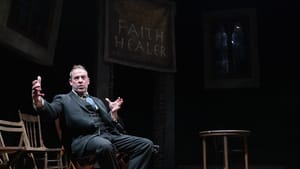Stay in the Loop
BSR publishes on a weekly schedule, with an email newsletter every Wednesday and Thursday morning. There’s no paywall, and subscribing is always free.
Acts of faith
Lantern Theater Company presents Brian Friel’s Faith Healer

The Fantastic Frank Hardy, the charismatic confidence man at the center of Brian Friel’s Faith Healer, now onstage at Lantern Theater Company, is first and foremost a man of the theater. Put him before an audience somewhere in rural Wales or Scotland, and he’ll convince the crowd he can cure their illnesses and revive their withered limbs. All it takes is some mood lighting, a scratchy record playing in the background, and a little belief.
The average person would probably see right through Frank’s deceptions with little effort. But like any religious rite, theater requires a suspension of disbelief. In this riveting revival of Friel’s 1979 drama, you feel you might follow Frank to the ends of the earth, even as his fibs and fabrications grow innumerable.
That’s as it should be. Throughout his career, Friel (1929-2015) grappled with the blurry overlap of truth and memory. His storytelling, like Frank’s art, demands that viewers disregard what they can plainly see in favor of some grand revelation that might remain elusive. It’s a delicate needle to thread, one that director Peter DeLaurier masterfully handles in his finely wrought production.
Expert Irish idiom
DeLaurier and his assembled cast—Ian Merrill Peakes, Geneviève Perrier, and Anthony Lawton—are experts at Friel’s elliptical Irish idiom. Three years ago, amid Covid-19’s darkest winter, they delivered the only streaming production that transported me back to the magic of live theater: a staging of Friel’s Molly Sweeney, another play that deals with the uncertainty of what can and cannot be seen. To have this group back together, in person this time, infinitely multiplies their capabilities.
Across four discrete monologues, the trio recall the small triumphs and jaded tragedies of Frank’s peculiar career, culminating in the night that he met his ignominious end. Frank (Peakes) narrates his travails with a mixture of bravado and ruefulness. Grace (Perrier), his long-suffering spouse, tries to hold herself together, crushed by the all-consuming love she feels for a shiftless man. Teddy (Lawton), his equally put-upon manager, vacillates between venerating Frank as a miracle worker and cursing him as a charlatan.
All three offer conflicting perspectives on the same events. Somehow, they all seem believable. That’s the power of Friel’s strange, hypnotic text. We see snatches of what might have been amid the distortions and misremembered details. Perhaps Frank really did heal an entire village of their ailments in one night. Maybe he and Grace really did have a child.
Friel also shows the audience the destructive aftermath that accompanies a kind of pathological devotion. Grace and Teddy deliver their monologues after Frank has left their lives, and the toll his presence has taken is evident in their behaviors: she is reduced to a chain-smoking ball of nerves, him to a hard-drinking nostalgist for a past that never truly existed.
Wiles and wounds
Although Perrier sometimes plays Grace’s self-pity in a manner approaching bathos, she ultimately sketches a revealing portrait of a woman who gave too much of herself to an unworthy partner. Lawton is simply extraordinary, his faux-posh accent and cheap smoking jacket (costumes by Marla Jurglanis) hiding deep wells of pain.
In the opening and closing sections of the play, Peakes perfectly balances the gaudy surface of Frank’s showmanship with the wounded soul underneath. It helps that he is a naturally charismatic performer, his subtle Irish accent drawing the audience close to him, inviting us to lean forward and listen to every word.
His tattered suit and sunken eyes betray the reality behind his performance—this is no divine being, just a man with a swindle—but in Peakes’s capable hands, you are easily seduced. And you are devastated when you realize what you’ve known all along: it’s an illusion.
The Lantern’s long-time goal
Throughout the production, Lily Fossner’s lighting design becomes as integral to the mounting drama as Friel’s own words. She washes Frank in chilling swaths of darkness, then shines bright bulbs on Grace, as if she were enduring an investigation. Soft accents underscore the seediness of Teddy’s London flat (the scenic design is by Nick Embree). The constant shift between gloomy shadow and stark sunlight accentuates the various moods of the play.
In remarks to the audience on opening night, Lantern executive director Stacy Maria Dutton commented that the company has wanted to produce Faith Healer for more than 20 years. In finally achieving that goal, they have delivered their strongest production in recent memory. That’s no con.
What, When, Where
Faith Healer. By Brian Friel, directed by Peter DeLaurier. $25-$45. Through March 3, 2024, at St. Stephen’s Theater, 923 Ludlow Street, Philadelphia. (215) 829-0395 or lanterntheater.org.
Accessibility
The performance area and restrooms at St. Stephen’s Theater are accessible by stairs only.
Sign up for our newsletter
All of the week's new articles, all in one place. Sign up for the free weekly BSR newsletters, and don't miss a conversation.

 Cameron Kelsall
Cameron Kelsall